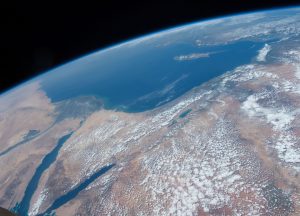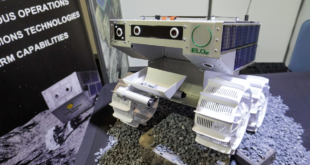
Diplomatic efforts are gathering in the Middle East and North Africa toward the development of a regional mechanism for space cooperation and development among Arab countries.
At the recent Global Aerospace Summit in Abu Dhabi, the region made progress toward establishing an Arab space organisation.
“In spite of our advanced mature space programme, we have a moral obligation, which is the vision of our leadership, to help Arab countries to set up some sort of space programmes and, at least, start thinking about space,” said Dr. Mohammed Al Ahbabi, Director-General of the UAE Space Agency. “If you don’t take steps today, you will be left out and it’s going to be harder to join the race because people are moving fast, and regulation will become strict, so there will be many limitations.”
The summit convened space and aerospace industry experts and officials from Arab countries to discuss the creation of an Arab-centric space agency, similar to the European Space Agency.
“The Middle East doesn’t have that yet and it’s a problem because we’re getting lost in the middle,” Al Ahbabi said. “We initiated the idea last year and our leadership gave us the green light. Sheikh Mohammed bin Rashid al-Maktoum, UAE Vice-President, Prime Minister and Ruler of Dubai, asked me to bring Arabs together to speak to them and work together. It’s to our benefit.”
Dr. Al Ahbabi explained that the Middle East’s lack of water resources compels its need for space-based capability. “We want to know where the water is located, and it is easily identifiable with space images and applications,” he continued. “The same applies to finding the best soil for agriculture, where we can build roads, cities, farming — and to see what resources are beneath the ground.”
In addition to assisting with identifying water and agricultural resources, space exploration can help Middle Eastern countries with other environmental issues, including analysing dust and gases in the atmosphere. It can also assist with communication, supporting the connection of schools, hospitals, and villages located across vast desert areas.
Last year, Saudi Arabia, Bahrain, Jordan, Algeria, Morocco, and Lebanon joined the Arab space conversation. This year, another five countries, including Kuwait, Oman and Sudan, were added. The second Arab meeting brought the coalition closer to forming a regional organization, which Dr. Al Ahbabi believes will succeed by focusing on science and education rather than politics.
The most efficient model, he said, is to help every country establish a space programme in a cooperative manner, sharing things like workforce, engineering resources, university space programmes, and satellite capabilities cooperatively between Arab countries. Bahrain, Algeria, and Egypt have already formed their own space-related agencies. Saudi Arabia, Kuwait, and Sudan are initiating internal discussions.
For its part, the UAE is leading the global race to space in the Middle East and North Africa. Its space agency is building a testing facility as part of the Middle East’s first space research centre, to act as an incubator for development and innovation. Ten specialised students are building two satellites in a temporary facility nearby. The UAE has seven satellites in orbit currently, with a plan to launch an educational satellite in mid-2018 and KhalifaSat later this year — the first designed and built in the country and which will take high-resolution images of Earth. Two other satellites are scheduled to be launched next year, with plans to have 20 covering communications, remote sensing, science, and environmental and climate change studies by 2020. The UAE also plans to launch its Emirates Mars Mission in 2020 to arrive in Mars orbit in 2021 to mark the 50thanniversary of the founding of the country.
“Space is transforming the UAE from a user to a producer, and some countries have now expressed interest in building satellites here,” Ahbabi said. “We try to lead by practice so they see that it can be done. It’s wonderful to be a part of the conversation about the future of humanity.”
 SpaceWatch.Global An independent perspective on space
SpaceWatch.Global An independent perspective on space




